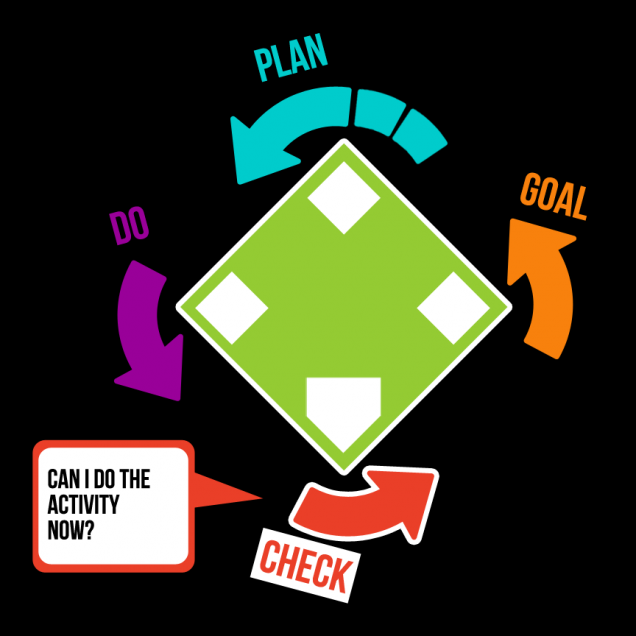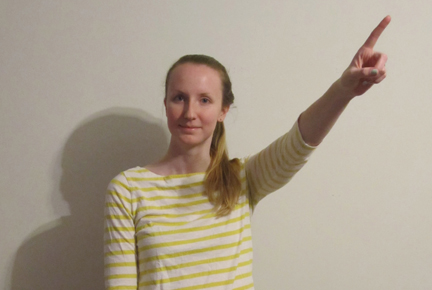Home: Check
Contents
The last base of the Game Plan is called Home: Check. During Home: Check, we ask the question, “Can I do the activity now?”
Each base of the Game Plan has a hand motion to help us remember what it means. When we ask “Can I do the activity now?,” we make this motion which represents making a check mark.
Another way to remember that the last base of the Game Plan is Home: Check, is by remembering the symbol. This symbol for Home: Check is a check mark.
Now it is time to ask yourself the question for Home: Check, “Can I do the activity now?”
How do I know if I’ve reached my goal?
You have been working toward your goal during Project TEAM and using the Game Plan to help you reach that goal. How do you feel when you reach a goal?
Some Project TEAM trainees have said that reading a goal can make them feel:
- Happy,
- Excited, or
- Proud.
However, sometimes people do not reach their goals. If there are still barriers, or parts of the environment that make it hard, and you have not figured out a strategy to remove or work around those barriers, you may not have reached your goal. If you did not reach your goal because of barriers, you can try a different strategy to help remove those barriers.
Did you meet your goal during Project TEAM?
- Did you do the activity like you wanted to?
- Did you find the information you needed?
- Did you try something new?
- How did you know that your reached your goal?
“Can I do the activity now?”
Download and print out the Home: Check Game Plan Worksheet. In the column on the left, look for the question, “Am I able to do this activity now?” If you are able to do the activity, check “Yes.” If you are still not able to do the activity, check “No.” If you want to, you can write why you are not able to do the activity in the column.
Now, go to the next column and look for the question, “Am I happy with the way I can do this activity?” This is important to ask, because maybe you can do the activity that you set out to do, but you are not happy about it. Maybe you want to do it more often or do it on your own without help. If you are happy with the way you can do the activity now, check “Yes.” If you are not happy with the way you can do the activity now, check “No.”
The question in the last column is, “Is there any part of the environment that still makes it hard for me to do the activity?” If you are not doing the activity, or if you are not happy with the way you can do the activity, there is probably a barrier that is making it hard for you to do the activity. Even if you can do the activity, there might be a strategy you can use to make it easier next time. If there are still barriers involved in your activity, check “Yes.” If there are no barriers involved in your activity, check “No.” If you checked “Yes,” look back at the 11 parts of the environment or the 6 strategies and write down what is still making it hard, or an example of a strategy you may want to use next time when you try to do this activity.
I reached my goal, now what?
Congratulations on reaching your goal! We hope that using the Game Plan helped you to do that. The last and final step of the Project TEAM Game Plan is to think of your next goal. Here are some questions that can help you think of your next goal:
- What activity would you like to do?
- What activity would you like to do more of, or do more often?
- What activity would you like to do more independently, or with less help?
- What activity have you always been interested in?
- What about a job, college, or job training?
- What about a new place to visit in your neighborhood?
You can use everything you have learned in Project TEAM and the Game Plan again on your own to help you reach a new goal! You can download the Game Plan Worksheet to help you work on your next goal.
If you like what you have read here on the Project TEAM website, you can also learn about opportunities to get involved in research as a Project TEAM trainee.


